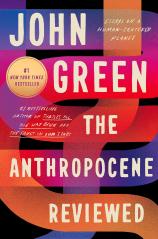The Anthropocene Reviewed: Essays on a Human-Centered Planet
Review
The Anthropocene Reviewed: Essays on a Human-Centered Planet
John Green kicks off his first collection of essays, THE ANTHROPOCENE REVIEWED, by introducing his wife, Sarah. She appears in several chapters and has wisdom for these times of brilliant discovery and heartfelt loss. “[T]here are no observers; only participants,” she tells him. Green paid attention.
In “Our Capacity for Wonder,” one of 44 essays on a far-ranging series of topics adapted from his podcast, Green looks closely at one sentence toward the end of THE GREAT GATSBY. The narrator imagines a moment when man must have held his breath seeing what the Dutch sailors first saw at what is now called New York. This sentence alone catapults America (specifically New York) to the center of the world. It is no small wonder now that F. Scott Fitzgerald’s novel is on every list of must-read books. It also establishes a man as the person upon whom the story is centered, again reflecting the 1920s sensibilities. More importantly to Green, the sentence says that man has for the last time in history held his breath with “something commensurate to his capacity for wonder.”
"Falling in love with the world is a worthy pursuit. As Green’s collection of contemporary, wise essays illustrates over and over with surprises and witty charm, he IS a participant."
Green believes that Fitzgerald is wrong. Wonders do not cease. We see only a brown oak leaf if we look only for a brown oak leaf. He points out that it is our attentiveness that is in short supply. We have great capacity for the discovery of awesomeness, but we need to focus.
In another revealing essay, “Harvey,” Green describes his first encounters with depression. He does not know if his girlfriend’s leaving caused it, or if the depression caused her to leave. He does know when he had to quit a job he liked very much, his boss gave him a single piece of advice: “Watch Harvey.”
The black-and-white film, which released in 1950, is about a mentally ill man, Elwood, whose best friend is a six-foot imaginary rabbit named Harvey. Elwood likes to hang out in bars and avoid being sent to a sanitorium where his sister believes he belongs. The chatty dialogue is magnificent, Green acknowledges, but it is Elwood’s soliloquies that moved him beyond the hopelessness he felt before watching. Elwood is kind, wrestles with a reality only he can identify, and appreciates even the mean ones.
Green’s advice, now more than ever, is to watch Harvey.
In yet another chapter on appreciating life today, he and Sarah visit the Bonneville Salt Flats. He explains that the pleasure of being a couple is enriched when there is a third thing, the contender, that they behold --- whether it is a piece of art, their own child, or The New York Times crossword puzzle. The “contender” concept comes from a passage in a Philip Roth novel, THE HUMAN STAIN, and each had underlined the same passage: “The pleasure isn’t owning the person. The pleasure is this. Having another contender in the room with you.”
That trip gives Green a fresh perspective on being a participant in the Anthropocene Age, where humans continue to believe, despite all evidence, that the world is here only for our benefit. He looks at the brutally white flats, almost menacing in their indifference to him and all mankind, and then he connects his gaze with Sarah’s. The Salt Flats, the third thing in this case, lose their power over him as he recalls “the people I used to be” and the hard-fought struggle to stand there beside her. In his signature sign-off, he gives the Bonneville Salt Flats three and a half stars.
John Green quotes Maurice Sendak from an NPR interview when he said, “I’m finding out as I’m aging that I am in love with the world.” Green and I agree that there is no more appropriate advice for the Anthropocene Age than these words from one of the world’s favorite poets. Falling in love with the world is a worthy pursuit. As Green’s collection of contemporary, wise essays illustrates over and over with surprises and witty charm, he IS a participant.
Reviewed by Jane Krebs on May 28, 2021
The Anthropocene Reviewed: Essays on a Human-Centered Planet
- Publication Date: March 21, 2023
- Genres: Essays, Nonfiction
- Paperback: 336 pages
- Publisher: Dutton
- ISBN-10: 0525555242
- ISBN-13: 9780525555247




